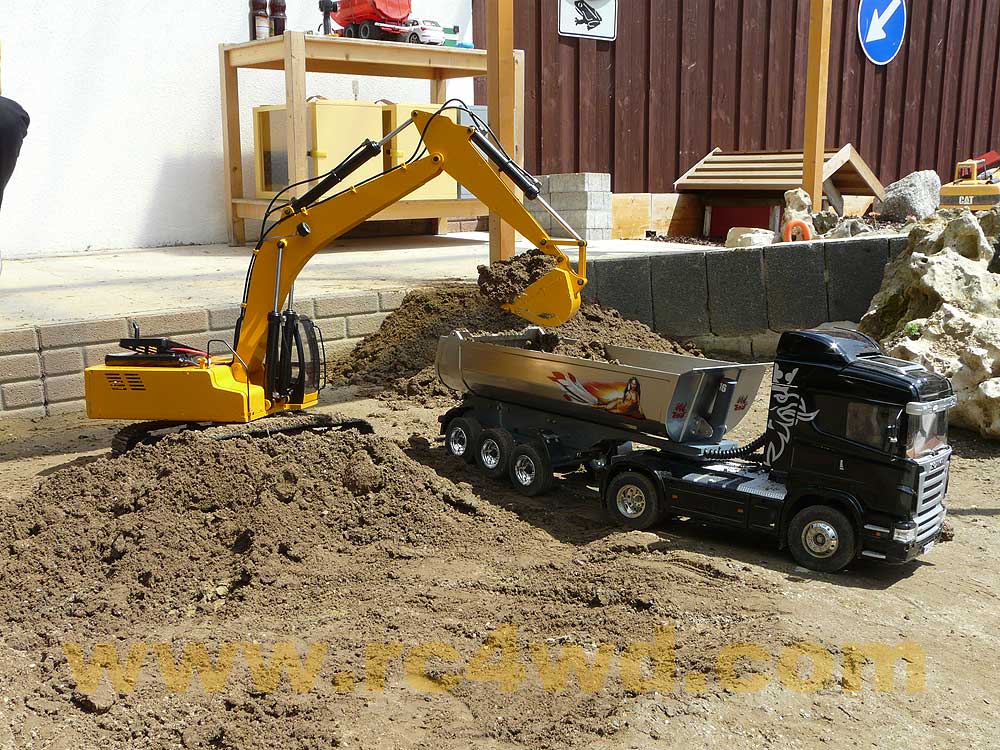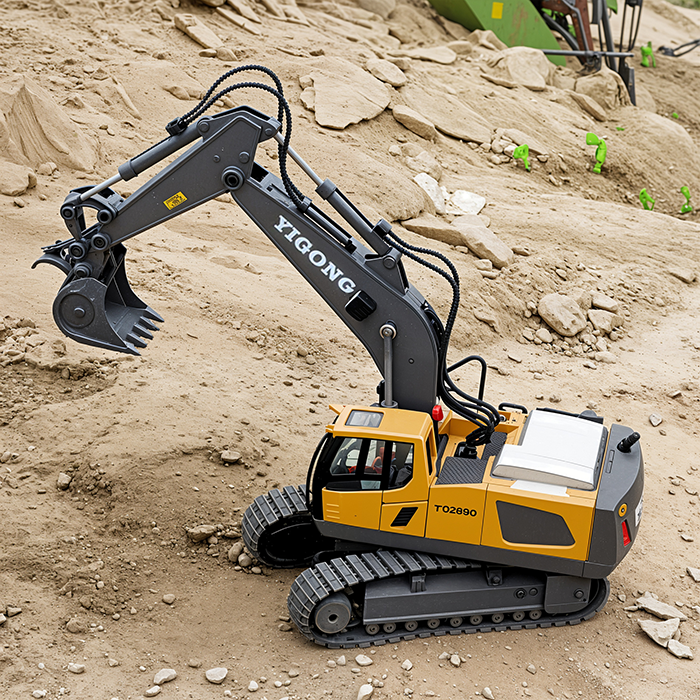Discover the Relevance of Excavator in Modern Building Projects
Excavators are essential devices in contemporary building projects. Their convenience enables them to do a broad range of jobs, from excavating and grading to demolition and site prep work. Advanced features, such as hydraulic accessories and general practitioners, improve their capabilities and effectiveness on job sites. As the industry progresses, the value of excavators grows even extra. Understanding their function can expose understandings into the future of building and construction techniques. What exists in advance for these machines?
The Flexibility of Excavators in Numerous Projects
Although excavators are frequently connected with massive building projects, their convenience permits them to be used in a large range of applications, from residential landscape design to energy upkeep. In city settings, excavators can browse limited areas to dig foundations for homes or mount drain systems. Their capability to perform delicate jobs makes them optimal for landscaping jobs, where they can dig deep into for fish ponds or plant trees. Furthermore, excavators play an essential role in utility upkeep, efficiently excavating trenches for pipes or cable televisions without interrupting surrounding locations. In agricultural applications, they assist in land clearing up and soil prep work. Their adaptability enables them to be furnished with various accessories, boosting their performance throughout various jobs. This multifaceted nature of excavators not just streamlines numerous building procedures but also shows their important function in modern infrastructure development and maintenance.
Trick Functions and Sorts Of Excavators
The conversation on essential attributes and kinds of excavators highlights the important features that make these machines invaluable in building. Various excavator kinds, each designed for details tasks, show their flexibility and effectiveness across various applications. rc excavator. Comprehending these features and classifications is important for maximizing their usage in modern-day construction jobs
Excavator Types Review
Excavators play an essential function in modern building, supplying versatility and effectiveness throughout different tasks. These hefty machinery devices come in several types, each tailored for particular applications. One of the most common kinds include crawler excavators, known for their security on irregular surface, and rolled excavators, which provide better wheelchair on paved surfaces. Small excavators are preferred for small tasks and tight rooms, while long-reach excavators are designed for deep excavating. Furthermore, there are customized excavators, such as hydraulic excavators, which improve power and accuracy. Each kind features one-of-a-kind capabilities, making them important for tasks varying from digging and grading to demolition and material handling. Recognizing these variants permits building specialists to pick the best excavator for their project requires.
Secret Features Explained
Understanding the essential features of excavators boosts their efficient application in building and construction tasks. Excavators are characterized by their powerful hydraulic systems, which provide the essential pressure for digging, training, and relocating materials. Their articulated arms permit a vast array of movement, promoting specific procedures in restricted spaces. In addition, the range of add-ons, such as buckets, grapples, and augers, expands their convenience to meet different task requirements. The dimension and weight of excavators additionally add to their security and ability to move on different terrains. Moreover, developments in technology have brought about the assimilation of GPS and automation, enhancing precision and performance in excavation tasks. These functions collectively position excavators as important tools in modern-day building and construction.
Applications in Construction
Changing construction sites, excavators play a crucial role across numerous applications, varying from residential building tasks to massive infrastructure advancements. These functional machines are geared up for jobs such as excavating foundations, trenching for utilities, and site grading. Various sorts of excavators, consisting of crawler, wheeled, and mini excavators, offer certain advantages customized to the task demands. Spider excavators stand out in rough terrains, while wheeled excavators use wheelchair on paved surfaces. Mini excavators are optimal for confined areas, making them prominent in urban setups. The efficiency and power of excavators substantially accelerate building and construction procedures, making sure prompt task conclusion. Their flexibility even more improves their value, enabling building teams to deal with a varied selection of obstacles efficiently.
Enhancing Effectiveness and Productivity on Job Sites
Making best use of performance and efficiency on task sites is an important objective in modern-day construction. Excavators play a pivotal duty in accomplishing this objective by enhancing numerous jobs. Their capability to perform multiple features-- such as training, excavating, and grading-- lowers the need for additional tools, consequently saving time and resources.Moreover, excavators enhance process by permitting faster conclusion of jobs. With sophisticated features like hydraulic attachments and GPS innovation, they can perform precise procedures that minimize errors and revamp. This precision not just improves the quality of job however additionally optimizes product usage, adding to set you back savings.The adaptability of excavators allows them to adapt to various website conditions, ensuring that tasks advance efficiently despite difficulties. By incorporating excavators into construction processes, groups can significantly boost their general performance, resulting in timely job completion and boosted success.
Safety And Security Benefits of Utilizing Excavators
Excavators greatly improve safety and security on building sites through enhanced driver exposure and minimized manual work risks. By supplying drivers with a clear sight of their environments, excavators assist to avoid injuries and mishaps. Furthermore, the equipment decreases the web demand for employees to take part in unsafe hand-operated jobs, additionally promoting a much safer work environment.
Enhanced Operator Exposure
Construction websites can be chaotic and loaded with prospective dangers, enhanced operator exposure plays a necessary duty in making certain safety and security when utilizing excavators. Modern excavators are designed with huge, unhampered windows and strategically placed mirrors, allowing operators to preserve a clear view of their environments (rc excavator). This boosted exposure is vital for finding pedestrians, various other equipment, and numerous barriers, significantly lowering the threat of crashes. Additionally, numerous excavators integrate advanced modern technology, such as cams and sensors, to offer drivers with extra viewpoints, even more improving recognition. The capacity to see even more plainly not only help in reliable operation yet also promotes a much safer work atmosphere, making it easier for drivers to navigate complex construction sites without endangering security criteria
Decreased Manual Labor Risks
When hands-on labor is minimized with making use of excavators, various safety and security advantages arise, considerably boosting the wellness of construction employees. Excavators minimize the physical strain connected with heavy training and repetitive tasks, properly decreasing the risk of bone and joint injuries. By automating procedures such as digging, grading, and relocating products, they permit employees to keep a much safer distance from prospective hazards. In addition, excavators are geared up with advanced safety functions, such as rollover security systems and improved driver comfort designs, which better secure employees on website. The result is a considerable decrease in work environment accidents and injuries, leading to enhanced performance and morale amongst building and construction teams. Ultimately, the fostering of excavators adds to a much safer and much more efficient building environment.
Excavators in Earthmoving and Site Prep Work
In modern-day building and construction, a substantial section of earthmoving and site prep work tasks depends on the performance and convenience of excavators. These machines are designed to manage various dirt types and surface, making them essential for grading, digging, and trenching tasks. Their hydraulic arms can be outfitted with different accessories, such as augers and containers, allowing drivers to tailor their method based on specific task requirements.Excavators succeed at relocating big quantities of planet rapidly and effectively, which speeds up the general construction timeline. They can browse limited areas and challenging websites where standard tools may battle, boosting efficiency. Furthermore, the precision of excavators assurances that site preparation follows rigorous specifications, lessening the danger of errors that could lead to expensive rework.
The Duty of Excavators in Demolition Tasks
Excavators play an important function in demolition jobs, as they have the power and agility needed to take down frameworks efficiently. Outfitted with numerous accessories such as hydraulic breakers, shears, and grapples, these machines can adjust to various demolition demands, whether for tiny structures or huge commercial websites. Their flexibility enables drivers to tackle complicated projects while maintaining safety and security and precision.In addition to their demolition capacities, excavators help with debris elimination, making certain that work sites continue to be risk-free and well organized. By breaking down frameworks into manageable pieces, they permit structured cleaning and recycling of products, straightening with modern-day sustainability efforts.Moreover, Discover More excavators can access tight areas and browse uneven surface, making them indispensable in metropolitan demolition tasks. Overall, their durable design and multifunctionality make excavators a critical property in the demolition phase of construction, contributing significantly to task timelines and effectiveness.


Future Fads in Excavator Technology and Usage
As the building and construction industry progresses, improvements in excavator technology are positioned to transform their usage and effectiveness noticeably. One significant pattern is the integration of automation and expert system, permitting excavators to operate with marginal human treatment. This change will certainly enhance precision in tasks such as grading and trenching, lowering human error and boosting productivity.Additionally, the surge of hybrid and electric excavators is shaping a much more sustainable construction environment, lowering carbon emissions and gas prices. Boosted telematics systems are also arising, allowing real-time monitoring of machine performance and maintenance requirements, which can result in far better operational performance and longer tools lifespan.Moreover, developments in add-on innovation are expanding the flexibility of excavators, allowing them to carry out a broader range of tasks. The mix of these patterns shows a future where excavators are smarter, greener, and a lot more adaptable, inevitably improving building and construction job dynamics.
Regularly Asked Concerns
Just How Do Excavators Contrast to Other Building Equipment?
Excavators, characterized by their versatility and power, stand out in excavating and earthmoving compared to various other machinery. Their capacity to carry out different jobs, consisting of training and demolition, makes them essential in building jobs, boosting total performance.

What Is the Typical Lifespan of an Excavator?
The typical life expectancy of an excavator typically ranges from 7,000 to 10,000 operating hours, relying on upkeep, usage conditions, and model. Appropriate treatment can prolong this life-span, making sure peak performance throughout its operational years.
Exactly How Are Excavators Kept for Optimum Efficiency?
Excavators call for routine upkeep for peak performance, consisting of regular evaluations, liquid checks, filter replacements, and timely fixings. Applying a precautionary upkeep schedule assists prolong their life expectancy click and guarantees effective procedure in various building settings.
What Are the Expenses Connected With Leasing vs. Buying an Excavator?
The expenses related to getting an excavator versus renting out vary substantially. Renting out offers lower upfront costs but can gather with time, while buying requires a considerable preliminary investment, yet supplies lasting financial savings and possession ownership advantages.
What Training Is Needed to Operate an Excavator?
Running an excavator requires specialized training, usually consisting of safety methods, maker operation methods, and environmental recognition. Accreditation programs frequently mandate sensible experience, enabling operators to manage various jobs effectively while guaranteeing conformity with market policies. The most typical kinds include spider excavators, recognized for their security on unequal terrain, and rolled excavators, which provide greater mobility on smooth surfaces. Tiny excavators are preferred for small-scale projects and tight areas, while long-reach excavators are designed for deep digging. Additionally, there are specific excavators, such as hydraulic excavators, which improve power and accuracy. Different kinds of excavators, consisting of spider, rolled, and mini excavators, give specific benefits tailored to the task needs. Crawler excavators succeed in rough surfaces, while wheeled excavators provide flexibility on smooth surfaces.